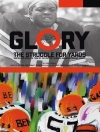Jorge Knijnik’s wonderful new book, The World Cup Chronicles – 31 Days that Rocked Brazil, is a unique and different look at the 2014 World Cup and its social, cultural, political and sporting impact on the people of Brazil.
The World Cup wasn’t ‘just’ a football tournament for Brazilian people – even though it came to be defined by the infamous 7-1 semi-final result against eventual winners, Germany – but it was part of the national psyche and important social change, overlaid by what we now know as corrupt practices within world football which included those in power in football in Brazil over decades.
Knijnik’s book looks at before, during and after the World Cup and discusses the much-vaunted ‘legacy’ issues to which FIFA has always pointed as being what they give back to a nation.
Tabella dei contenuti
Preface
Introduction
‘Imagine in the World Cup’: sport mega events and social exclusion in Brazil
Screw the World Cup: but call me if the Selecao scores, please!
The game’s owners: a brief history of the Havelange-Teixeira famiglia
Pele and Ronaldo: from national pride to anti-heroes
Romario: the striker at the national Parliament
Never say no to Teixeira: famiglia business and the new World Cup stadiums
Following Socrates’ paths: Bom Senso FC and the start of a footballing revolt
What the hell was the Maracanazo?
June 2013: a social revolution in the midst of international football
The World Cup trophy is ours? Bye-bye to the football nation
The magic is in the air: is the World Cup a ‘megalomaniac project’ that went well?
Futebol arte, the soul of the game: a tribute to Garrincha
FIFA, go home – but first try an acaraje and pay a taxi fare
Brazil and Argentina: a friendly rivalry
Authentic learning, Brazilian teachers and the World Cup’s education legacy
Will girls ever own the ball? Women, football and gender legacy in Brazil
Professor Felipao’s pedagogies or when the family did not show up for Christmas
The Selecao’s camp: why should we practice?
The Argentinean lesson
Hey, Dilma, shove it up?
Brazilians all let us rejoice: FIFA arrests and a new era for world football?
From Dunga to Tite: is the Selecao worth a devil’s kiss?
Is the FBI coming? The nightmares of a Federation president
The ‘7-1 syndrome’: will Brazilian football never learn?
Who will pay the bill of ‘the best World Cup ever’?
Marta is better than Pele
Cultural and political legacies of the World Cup: where to now? (with Ramon Spaaij)
Brazil 3014: a Garrincha-Socrates dream or a Havelange-Teixeira nightmare?
Afterword
Bibliography
Acknowledgements
Circa l’autore
Jorge Knijnik Jorge is an Associate Professor at the Western Sydney University (School of Education and Institute for Culture & Society).
He was born in Rio Grande do Sul, Brazil’s southernmost state. He moved to Sao Paulo with his family as a child, and started to love football watching Pele playing on the Pacaembu stadium.
Jorge writes and researches on a number of topics, from sport in society, culture and history, to gender and human rights in education, to physical education pedagogies, to drama studies and fandom culture.
His current research examines the socialisation process within football fans in Greater Western Sydney and how football fandom has the potential to make a significant contribution to community cohesion and regeneration in the area. He is also involved in a number of projects looking at the political and cultural contradictory legacies of sports mega events in Brazil
He currently lives in Sydney with his four children and his wife, where he enjoys the beautiful beaches and his bike rides – but misses the Brazilian rhythms.











